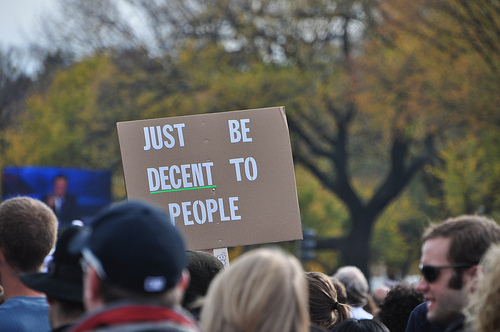There's an iconic scene in the 1990 film "The Bonfire of the Vanities" in which a courtroom erupts in raucous chaos when an utterly unscrupulous special interest group tries to hijack the proceedings.
Shouting over the din, the presiding judge (played by the inimitably baritoned Morgan Freeman) finally manages to silence the protesters. Then he offers them this pithy bit of advice: let go of the selfishness, hatefulness, petty resentments, recriminatory name-calling, and religious and political prejudices that disguise themselves as principled stands.
Just be decent, the judge says. Try to be decent people.
Cynics will sneer at this as cracker-barrel naiveté. But they'd be mistaken, because decency is the rock-bottom moral principle that must be honored if a person or a society wishes to be good. It doesn't matter if you're religious or atheist, liberal or conservative, rich or poor, woman, man, or transgender, gay or straight, black, brown, or white. To qualify even minimally as moral, we're obliged to act decently to our fellow humans by treating them with respect, honesty, and civility, even when--especially when--we disagree with them.
We may never fully understand the tangled web of motives that drove Omar Mateen to his horrific act of violence in that Orlando nightclub last Sunday morning. But his simmering rage and hatred that exploded in the most violent shooting spree this already blood-spattered nation has endured was nurtured by a culture suffering from the moral dry rot that sets in when decency diminishes. Although Mateen pulled the trigger, our increasingly toxic ethos of nastiness, vituperation, personal attacks, religious bigotry, and political paranoia egged him on.
Public discourse in America has often been rough and tumble. A quick glance at the sparring between Jeffersonian republicans and Hamiltonian federalists in the early 1800s or New Deal champions and detractors in the 1930s testifies to that. But the media in which past debates were played out had limited resources and audiences. They didn't benumb the general public's moral sensibilities with incessant and escalatingly vicious rhetoric.
The age of instant internet communication has changed that. The vilest prejudices and most hateful rants can be relayed instantaneously to millions of people with little if any ill consequence for the senders. This has atrophied both our ability and our desire to self-censure. It's now morally acceptable, and even devilishly entertaining, for public figures and private citizens alike to strain for the lowest possible insult or caricature.
Indecency has become the default position.
Some of us gleefully engage in hateful speech and actions deliberately intended to dehumanize whatever group or individual we dislike. But more commonly, we attack by thoughtlessly shooting from the hip with groundless condemnations that, delivered frequently enough, embed themselves so firmly in the popular mind that they take on the look and texture of conventional wisdom. When this happens, our moral gauges are thrown so off-kilter that it's hard to notice, much less condemn, our own indecency.
If, for example, we loudly and incessantly proclaim that non-heterosexual love displeases God and is morally repugnant, we shouldn't be at all surprised when someone who's had that message drilled into his head does something reprehensible to our LGBT sisters and brothers. Afterwards, it just won't do to claim with wide-eyed faux-innocence that our own hands are spotless because we didn't do the actual shooting, or that all we meant to say was "hate the sin but love the sinner." We share the guilt.
If we regularly and shrilly insist or even just silently agree that the borders of this nation ought to be locked down to protect us from Mexican "rapists," Muslim terrorists, or Syrian refugees, we oughtn't to feign astonishment when immigrant Mexicans, Muslims, Syrians, or any other "outsiders" are treated with disdain, suspicion, and fear. We bred the climate of hate.
All this and more is only to be expected if, in our indecency, we divide people into "us" and "them," with "us" being absolutely right and virtuous, and "them" being unequivocally wrong and wicked. Then the "thems" who inconveniently dwell among us become fair game.
We desperately need to remember how to disagree without vilifying; to accept and perhaps even celebrate differences rather than condemning them simply because they're different; to listen rather than declaim; to replace kneejerk judgmentalism with empathy; and to reset our default position to civility in word, thought, and deed.
We need to learn how to be decent again.

